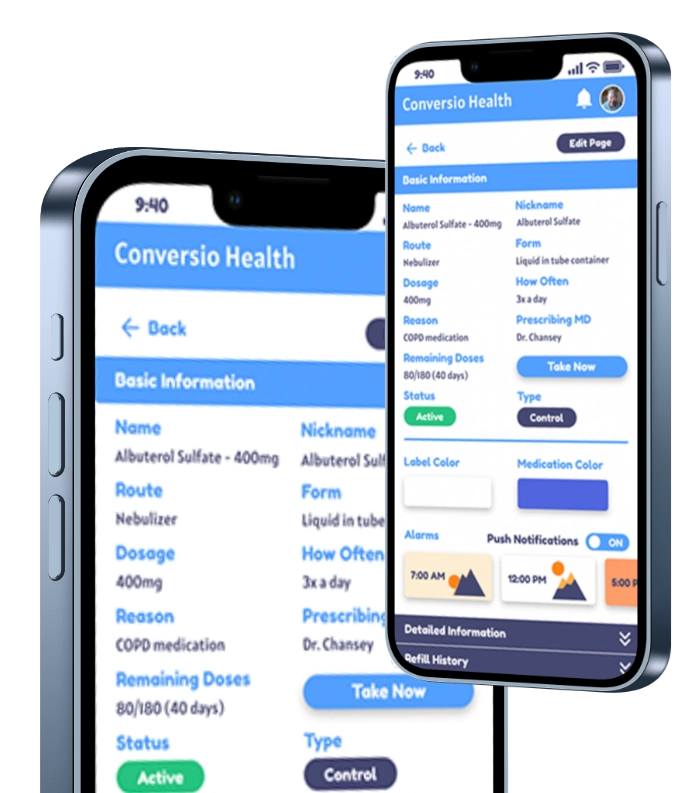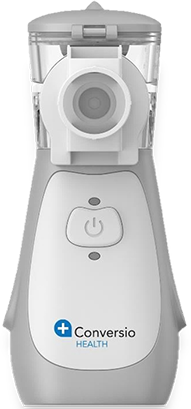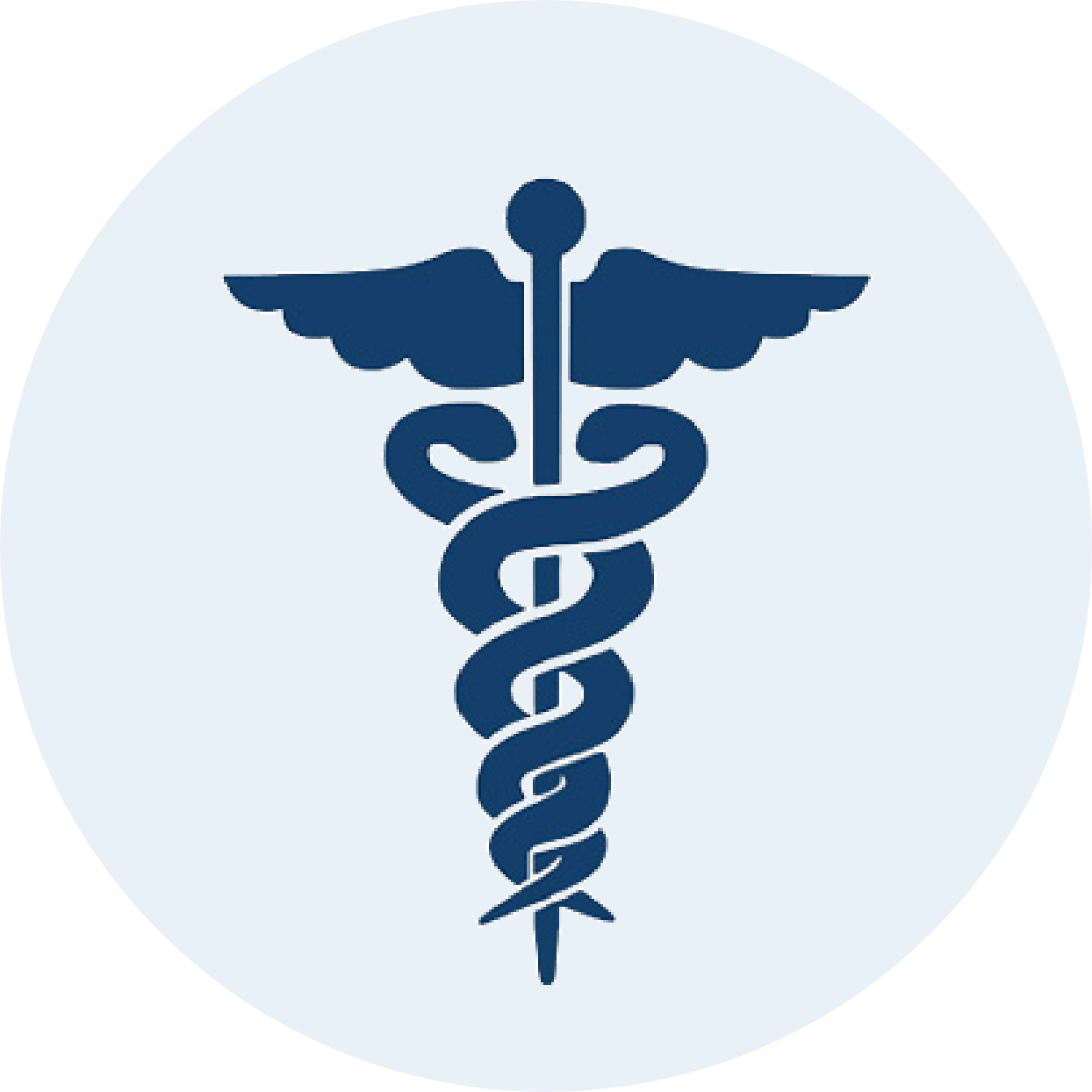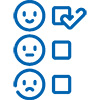Our Partners
Our value-based chronic respiratory management program delivers an end-to-end patient care solution.
Conversio provides a comprehensive disease management program designed to improve care, adherence, and cost associated with chronic respiratory conditions.
Pharmacists, Respiratory
Therapists & Health Coaches
Innovative Patient Facing Technology Platform
Inspire™ Virtual Pulmonary
Rehab Program
Smart Portable Nebulizer
& Inhaler Devices
AI Predictive Analytics Monitor Real-time Patient Data
Custom Nebulizer
Medications
Robust AI and Technology Platform
AI & Predictive Analytics Engine
- Identifies patients needing the Conversio disease management program
- Targets patients who are at risk of hospitalization
- Provides real time risk-based clinical alerts
Conversio Health App
- Keep track of medications
- Order refills
- Monitor smart device readings
- Access the Inspire program
Custom Analytics and Patient Level Reporting for Partners and Providers



Unique Nebulizer Medications
Long-acting and Combination Ingredient Nebulizer Medications (including LAMA, LABA/ICS, LABA/LAMA, LABA/LAMA/ICS formulations)—Shipped directly to patient homes.
Smart Devices


Portable Nebulizer
WIRELESS
- Bluetooth connection to Conversio Health App
PORTABLE
- Pocket-sized
- Rechargeable battery
OPTIMIZED
- Smart sensor detects breathing to
optimize medication delivery


3-in-1 Inhaler Device
SMART SENSOR
- Records inhaler usage and technique data
CLINICAL-GRADE SPIROMETER
- At-home spirometry test in < 10 seconds
TRAINING DEVICE
- Light and audio queues encourage proper inhaler technique
- Compare personal best and average usage data
Conversio Pharmacotherapy Management & Clinical Services
Conversio Health is staffed with a team of resources focused on improving respiratory health for patients. These resources include clinical pharmacists, respiratory therapists, health coaches, and patient care coordinators who are consistently engaged with patients on at least a monthly basis and conduct a broad array of interventions including but not limited to:

- Symptom and adherence monitoring
- Refill reminders
- Medication therapy adjustment
- Provider coordination
- Patient education including wellness and health promotion
- Smoking cessation
- Health status assessments
- Caregiver support and education
Inspire™ Virtual Pulmonary Rehabilitation Program
The Inspire Program is an intensive 12-week program designed to help patients better manage their COPD and enhance their quality of life.
Patients have weekly one-on-one sessions with clinical pharmacists, respiratory therapists, and health coaches.
Tailored Workouts
Improve stamina and lung function.

Breathing Techniques
Manage breathlessness better.

Convenience
Accessible from the comfort of home.

Education & Empowerment
Learn about COPD and its triggers.

Expert Guidance
Support from clinicians boosts progress.

Flexible & Interactive
Adaptable and personalized program.

Conversio Health works with stakeholders across the country to deliver the most comprehensive value-based disease management program for respiratory care.
Conversio Health partners with these customers to improve patient outcomes and reduce total cost of care.
Medicare Advantage Plans

Managed Medicaid Plans

At Risk Provider Groups

Conversio Benefits for Partners
- Reduction in medical costs
- Reduction in pharmacy costs
- Improvement in patient satisfaction
- Enhancement of star ratings and HEDIS measures
- Decreased hospital utilization
- Increased medication adherence
- Improvement with provider patient coordination
- Achievement of COPD value-based incentives
- Improvement in patient outcomes
Conversio Health Business Model
Conversio Health collaborates with its customers to create partnerships that will maximize value for the customer and the patient. While Conversio Health can be flexible around how exactly fees and incentives are structured, typically programs are delivered in value-based arrangements:

All-inclusive Monthly COPD/Asthma Program Fee
Covers full disease management program including unlimited:
- COPD/Asthma Medications
- Traditional Nebulizers
- Conversio Smart Devices (SmartNeb & SmartCap)
- Virtual Pulmonary Rehab
- Conversio Connect App
- High-touch Pharmacotherapy Management Services
Charged only for enrolled and engaged members/patients. No minimum patient volume.
Pay for Performance Option
- Performance incentives/penalties based upon performance against predefined quality & satisfaction measures
Full Risk Option
- Up to 100% of fees put at risk to guarantee outcomes/ROI
- Shared savings/bonus opportunity to align incentives
Conversio’s Impact for its Partners
3:1 ROI
$4500 Per Member Per Year in Medical Cost Savings
$500 Per Member Per Year in Pharmacy Cost Savings




